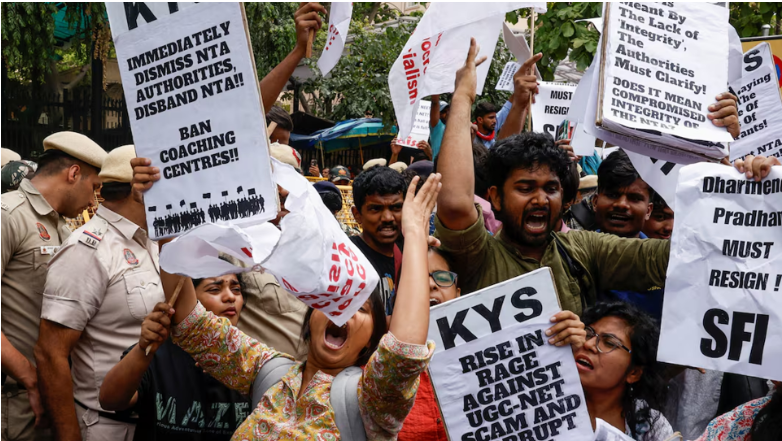The 25-year-old freelance researcher and disability activist uses a wheelchair as she has a rare congenital condition of stiff joints and found the exam centre difficult to access. The road outside was dug up, the steep ramps were unusable for wheelchairs – and the centre itself did not have a wheelchair
If all this was not enough, a ruder shock awaited her.A day after taking the four-hour test, with her caregiver mother waiting outside in the sweltering heat, authorities cancelled the UGC-NET – as the exam is called – which had been taken by over 900,000 candidates across more than 300 cities.
The education ministry initially put out a cryptic statement saying the “integrity of the exam may have been compromised”. A day later, minister Dharmendra Pradhan admitted the question paper had been leaked on social media platform Telegram and on the “dark net”.“I feel very angry. It’s like a double whammy for me. I don’t think I have the energy to go through this exam again,” Kavya told me.Nearly 1,000km (600 miles) away in the city of Patna, Archit Kumar faces a similar challenge.
In May, the 19-year-old aspiring doctor sat for a 200-minute nationwide government-run undergraduate exam where 2.4 million aspirants competed for over 110,000 medical college seats.A scandal erupted shortly after the exam – four people were arrested in Bihar state for allegedly leaking the question papers of what is called the National Eligibility Cum Entrance Test (Undergraduate), or NEET-UG exam.
There were widespread allegations of cheating, with many candidates scoring suspiciously high marks. Aspirants openly reported being cold-called by touts demanding up to 3m rupees ($35,918; £28,384) for question papers just hours before the exam. Some even recorded the calls as evidence.
Many students and parents are demanding a re-test, with numerous petitions filed in courts for the purpose – and the Supreme Court is examining this. Pradhan ordered an investigation and admitted “some errors limited to specific regions” had happened. He said the fate of millions of aspirants would not be held hostage for “some isolated incidents”.
